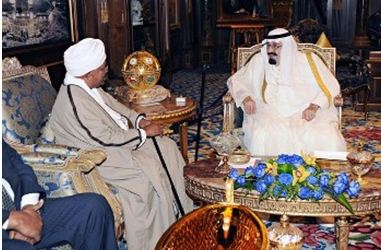IMF report shows Saudi Arabia less generous to Sudan than to other Arab nations
September 23, 2012 (WASHINGTON) – Saudi Arabia’s financial aid to Sudan accounted for only 1.34% of the total amount of money allocated by the oil-producing nation to other Arab countries over the last eighteen months, according to a report by the International Monetary Fund (IMF).

The figures which covered January 2011 to June 2012 puts Sudan in eighth place out of the nine Arab countries which received financial promises from Saudi Arabia. Largest recipient of Saudi aid were Bahrain & Oman ($5 billion), Egypt ($3.99 billion), Yemen ($3.60 billion), Jordan ($2.65 billion), Morocco ($1.25 billion), Tunisia ($750 million), West Bank and Gaza ($340 million) and Djibouti ($40 million).
Khartoum has been grappling with a worsening economic crisis ever since the oil-rich South Sudan became an independent state in July 2011. Sudan was forced to adopt unpopular austerity measures aimed at curtailing spending and preventing depletion of foreign currency reserves which was pushing inflation to record levels.
The Sudanese government dispatched delegations to several Arab countries seeking help including a visit by president Omer Hassan al-Bashir last March to Riyadh where he met with Saudi King Abdullah.
But only Qatar made a public pledge in the amount of $2 billion in the form of treasury bills and other investments. It was not immediately clear if Doha followed through on its promise.
In contrast Sudan’s northern neighbor received more than $5 billion in loans and pledges, including $2 billion in direct budget support from Qatar and loans from Saudi Arabia and the Islamic Development Bank.
Qatar deposited $500 million in direct budget support at the Egyptian central bank in August and said it would pay the remaining $1.5 billion over the coming three months. This month the Qatari Prime Minister said it would invest $18 billion dollars in tourism and industry projects along Egypt’s Mediterranean coast over the next five years.
Sudan’s hefty $38 billion debt and chilly relations with Western nations as well as U.S comprehensive economic sanctions means that the East African nation has limited venues for borrowing to cover its budget gap.
China, which has been Khartoum’s main political and economic backer over the last decade, has scrapped financing for dozens of projects in Sudan citing lack of oil collateral.
Earlier this year the U.S. special envoy to Sudan Princeton Lyman told U.S. lawmakers that the Obama administration wants Arab countries to link any financial help to Khartoum with allowing humanitarian aid to rebel-held areas in the border states of Blue Nile and South Kordofan.
Lyman also claimed that some unnamed countries have recently “stopped giving Sudan considerable assistance”.
Last month the Financial Times newspaper reported that Washington would push rich Arab states as well as China to help Khartoum plugging part of its $3 billion budget deficit and will waive sanctions preventing dollar transactions to Sudan.
The U.S. hopes that this move would encourage Sudan to seal a deal with its southern neighbor on oil exports which was suspended by Juba as a result of disagreement on oil transport fees Khartoum wanted to charge.
(ST)
